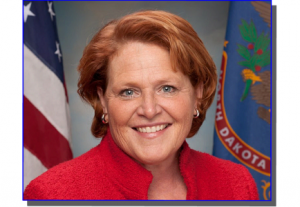VALLEY CITY, N.D. (CSi)– U.S. Senator Heidi Heitkamp Wednesday brought the top U.S. Department of Agriculture (USDA) official overseeing conservation compliance to a Valley City Roundtable, to call on him to improve conservation compliance requirements in the 2014 Farm Bill so that they work better for North Dakota’s farmers.
Heitkamp also wanted USDA Under Secretary for Natural Resources and Environment Robert Bonnie to hear directly from farmers about how conservation compliance requirements are burdening them.
During the drafting of the 2014 Farm Bill, Heitkamp – a member of the Senate Committee on Agriculture – played a key role in eliminating the most harmful provisions associated with a new policy to require conservation compliance for crop insurance which would have seriously burdened farmers, and she continues to push for further changes. Prior to the passage of the 2014 Farm Bill, farmers already had to comply with significant conservation compliance requirements as a condition of participation in the farm program. The new requirements, which Heitkamp successfully opposed, would have only added to the burden. Today, joined by North Dakota farmers, she asked Under Secretary Bonnie to take special attention as the Administration implements the key changes Heitkamp helped make to the conservation compliance program in the 2014 Farm Bill so they better support farmers as Heitkamp intended.
Heitkamp says, “With conservation compliance tied to the crop insurance program in this year’s Farm Bill, it’s absolutely critical that we make sure North Dakota’s farmers can continue to be successful. As we worked on the 2014 Farm Bill, I fought these damaging requirements, successfully eliminating some of the worst provisions for our farmers. And today, Under Secretary Bonnie had the chance to hear firsthand from our farmers, just as I have, about the challenges they face in complying with these rules. Agriculture is a driver of North Dakota’s economy and we have to make sure the Farm Bill and its requirements are implemented in a way that works best for farmers in our state and throughout the country.”
North Dakota farmers have faced serious challenges complying with existing conservation requirements related to wetlands, which prevent farmers from moving water on their farmland without prior approval from USDA. Additionally, North Dakota farmers have dealt with uncertainty regarding what constitutes a wetland under the conservation compliance policy in wet seasons where water temporarily pools on a farm. This uncertainty makes it difficult for farmers to manage water that accumulates during wet seasons. If a farmer drains excess water in violation of conservation compliance, he or she may be subject to heavy payback penalties – with the potential to put growers out of business.
In addition to removing the most harmful provisions in the 2014 Farm Bill associated with conservation compliance, Heitkamp also made several improvements to the conservation compliance requirement. Specifically, she worked to make sure the law is forward-looking; confirmed that it doesn’t hurt growers who unintentionally violate the rules of the program, but instead helps them comply with the law; and guaranteed that it provides a realistic timeframe for growers to reach compliance before they are penalized in the event that a violation is found on the farm. She continues to push for further changes to the program to better stand up for farmers. Click here to view a letter Heitkamp gave Under Secretary Bonnie today outlining the strong action she took to address conservation compliance in the Farm Bill.
Since the Farm Bill was signed into law, Heitkamp has also worked to make sure it is implemented properly. In the first month after the Farm Bill passed, she was successful in leading a bipartisan effort to get U.S. Secretary of Agriculture Tom Vilsack to expedite the new livestock disaster programs to help ranchers devastated by an unexpected fall blizzard. Heitkamp has also led an effort to support farmers who are prevented from planting crops due to adverse weather, as part of the newly-created safety net program in the Farm Bill.
The Roundtable was held at Valley City State University, at Froemke Auditorium, Foss Music Hall.

















Comments are closed
Sorry, but you cannot leave a comment for this post.